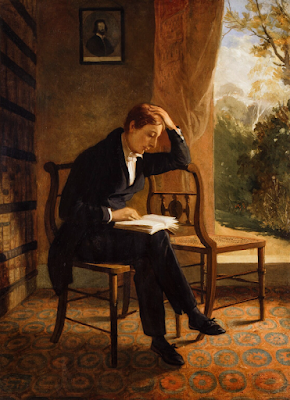John Keats
(1795 - 1821)
To a Lady Seen for A Few Moments at Vauxhall*
Time’s sea hath been five years at its slow ebb,
Long hours have to and fro let creep the sand,
Since I was tangled in thy beauty’s web,
And snared by the ungloving of thine hand.
And yet I never look on midnight sky,
But I behold thine eyes’ well-memory’d light;
I cannot look upon the rose’s dye,
But to thy cheek my soul doth take its flight.
I cannot look on any budding flower,
But my fond ear, in fancy at thy lips
And hearkening for a love-sound, doth devour
Its sweets in the wrong sense: — Thou dost eclipse
Every delight with sweet remembering,
And grief unto my darling joys dost bring.
Long hours have to and fro let creep the sand,
Since I was tangled in thy beauty’s web,
And snared by the ungloving of thine hand.
But I behold thine eyes’ well-memory’d light;
I cannot look upon the rose’s dye,
But to thy cheek my soul doth take its flight.
But my fond ear, in fancy at thy lips
And hearkening for a love-sound, doth devour
Its sweets in the wrong sense: — Thou dost eclipse
And grief unto my darling joys dost bring.
A una dama fugaz
Cinco años ha
estado el mar del tiempo en bajamar,
y en largas horas han dejado su rastro las arenas
desde que tu belleza me fascinó en su propia piel
y tu mano sin su guante me envolvió.
Y no he de
mirar, nocturno, el cielo,
sin ver en mi memoria el brillo de tus ojos...
Y no he de contemplar de la rosa el color,
sin que mi alma evoque tu mejilla.
Y nunca habré
de ver el brote de la flor,
sin que el oído, dulce, prendado de tus labios,
se entregue, esperando una palabra de tu amor,
a ti,
delicia, en su más recto sentido: porque tú eclipsas
toda mi dicha con el más dulce recuerdo,
y llenas de nostalgia mis más felices alegrías.
y en largas horas han dejado su rastro las arenas
desde que tu belleza me fascinó en su propia piel
y tu mano sin su guante me envolvió.
sin ver en mi memoria el brillo de tus ojos...
Y no he de contemplar de la rosa el color,
sin que mi alma evoque tu mejilla.
sin que el oído, dulce, prendado de tus labios,
se entregue, esperando una palabra de tu amor,
toda mi dicha con el más dulce recuerdo,
y llenas de nostalgia mis más felices alegrías.
© Traducción
española de Jesús G. Maestro.
_______________
[*] John Keats, «To a Lady Seen for A Few Moments at Vauxhall» (1818), Poemas escogidos, Madrid, Cátedra, 2009, pág. 198. Ed. bilingüe de Juan V. Martínez Luciano, Pedro Nicolás Payá y Miguel Teruel Pozas. Introducción y notas de Juan V. Martínez Luciano.
Comentario de texto
Garcilaso y
Góngora ante Keats:
cómo el Romanticismo
pierde de vista la realidad y la
belleza vida
* * *

